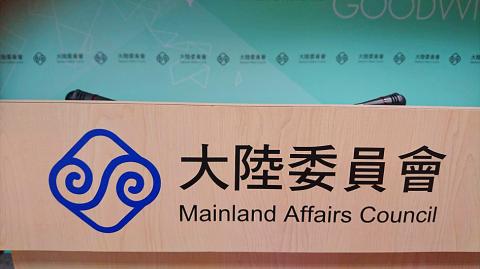The Mainland Affairs Council (MAC) said it is closely monitoring developments as China begins allowing Taiwanese to become elementary and junior-high school teachers, a role that entails pledging allegiance to the Chinese Communist Party (CCP) and carrying out the CCP’s ideological and political education.
Beijing has allowed Taiwanese who have obtained Chinese residency permits to apply for the teaching positions, with the application period ending on Friday.
China’s Taiwan Affairs Office spokesman Ma Xiaoguang (馬曉光) on Wednesday hailed the program as “another excellent policy realizing the equality of Taiwanese compatriots after the 31 measures announced last year.”

Photo: Chung Li-hua, Taipei Times
The policy is aimed at addressing the needs of Taiwanese studying in Chinese universities with the goal of becoming teachers, he said.
The application requirements include “supporting the CCP leadership, cleaving to the socialist direction of education and implementing all educational goals of the party.”
The educators would be required to attend “thought education” and sing the March of the Volunteers — the Chinese national anthem — as part of their job, sources said.
The council yesterday said that the Act Governing Relations Between the People of the Taiwan Area and the Mainland Area (台灣地區與大陸地區人民關係條例) forbids Taiwanese from joining the CCP or serving in the Chinese government or armed forces.
While the law does not specifically prohibit Taiwanese from teaching at elementary schools in China and the Ministry of Education has not determined the legal status of the academic program, the council said that Taiwanese employed by Chinese schools could still be in breach of the regulations under some circumstances.
As the application for such teaching positions included a political prerequisite, the council called on Taiwanese “to be aware of China’s political intent,” saying that Beijing is demanding that people make known their political stance under the guise of relaxing eligibility.
Chinese President Xi Jinping (習近平) in March last year said at the CCP National Congress and at the Chinese People’s Political Consultative Conference that the CCP should “augment patriotic education to pass on the ‘red DNA’ to the generations to come.”
The Chinese government has also been increasing its reliance on public schools as an instrument of political indoctrination, the New York Times reported in October 2017.
The Chinese Ministry of Education’s approved curriculum — including exercises in math classes — featured stories of revolutionary heroes, writings by Mao Zedong (毛澤東) and mythologized CCP history, such as the Long March, the newspaper said.
At the time, Beijing had established 231 model “Red Army” elementary schools, to which Xi and his mother had donated the equivalent of tens of thousands of US dollars, it said.
Although Ma touted the opening of the Chinese educational system to Taiwanese teachers as a beneficial measure, sources said that Chinese teachers are poorly paid.
While the salary for elementary and junior-high school teachers with a master’s degree in Taiwan is about NT$56,000 (US$1,816) per month, teachers in China with the same qualifications and job description are paid about 5,000 yuan (US$738), or 2,000 yuan in rural areas, the sources said.

MAKING WAVES: China’s maritime militia could become a nontraditional threat in war, clogging up shipping lanes to prevent US or Japanese intervention, a report said About 1,900 Chinese ships flying flags of convenience and fishing vessels that participated in China’s military exercises around Taiwan last month and in January have been listed for monitoring, Coast Guard Administration (CGA) Deputy Director-General Hsieh Ching-chin (謝慶欽) said yesterday. Following amendments to the Commercial Port Act (商港法) and the Law of Ships (船舶法) last month, the CGA can designate possible berthing areas or deny ports of call for vessels suspected of loitering around areas where undersea cables can be accessed, Oceans Affairs Council Minister Kuan Bi-ling (管碧玲) said. The list of suspected ships, originally 300, had risen to about 1,900 as

Japan’s strategic alliance with the US would collapse if Tokyo were to turn away from a conflict in Taiwan, Japanese Prime Minister Sanae Takaichi said yesterday, but distanced herself from previous comments that suggested a possible military response in such an event. Takaichi expressed her latest views on a nationally broadcast TV program late on Monday, where an opposition party leader criticized her for igniting tensions with China with the earlier remarks. Ties between Japan and China have sunk to the worst level in years after Takaichi said in November that a hypothetical Chinese attack on Taiwan could bring about a Japanese

MORE RESPONSIBILITY: Draftees would be expected to fight alongside professional soldiers, likely requiring the transformation of some training brigades into combat units The armed forces are to start incorporating new conscripts into combined arms brigades this year to enhance combat readiness, the Executive Yuan’s latest policy report said. The new policy would affect Taiwanese men entering the military for their compulsory service, which was extended to one year under reforms by then-president Tsai Ing-wen (蔡英文) in 2022. The conscripts would be trained to operate machine guns, uncrewed aerial vehicles, anti-tank guided missile launchers and Stinger air defense systems, the report said, adding that the basic training would be lengthened to eight weeks. After basic training, conscripts would be sorted into infantry battalions that would take

DEEP-STRIKE CAPABILITY: The scenario simulated a PLA drill that turned into an assault on Taiwan’s critical infrastructure, with the launchers providing fire support Taiwan yesterday conducted this year’s first military exercises at Longsiang Base in Taichung, demonstrating the newly acquired High Mobility Artillery Rocket System’s (HIMARS) ability to provide fire support and deep-strike capabilities. The scenario simulated an attack on Penghu County, with HIMARS trucks immediately rolling into designated launch areas and firing barrages at the Wangan (望安) and Cimei (七美) islands, simulating the provision of fire support against invading forces. The HIMARS are supposed to “fire and leave,” which would significantly increase personnel and equipment survivability, a military official said. The drill simulated an exercise launched by the Chinese People’s Liberation Army (PLA) Eastern